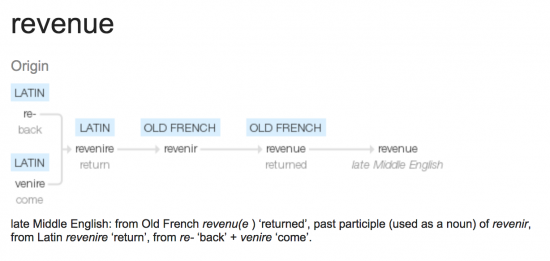This is fascinating. What it shows is the etymology of the word revenue:
As a commentator, using the name Calgacus, said in a comment on the blog yesterday:
Revenue is a pretty good word to use for taxation. What is bad is the idea that it provides income for the state. Revenue comes from re + venir; means to come BACK. It encapsulates the idea that taxation returns unto Caesar what originally came from Caesar, the correct spend first, tax later order.
Or, in other words, it is MMT compliant.
Thanks for reading this post.
You can share this post on social media of your choice by clicking these icons:
You can subscribe to this blog's daily email here.
And if you would like to support this blog you can, here:




Touché!
Render unto Caesar that which is Caesar’s.
This is a dangerous road to go too far down as ‘revenu’ in French can often mean rents – as it probably can in English. But at least, by the same logic, HMRC is also MMT compliant!
Unless, you understand rent as the return (revenu) on investment in property, just as tax is the return (revenu) on investment in the public goods of the economy.
The OED reckons “revenue” comes from French “revenu”, meaning income returned from a property or post; that is, rent. And has had that sense since the 13th century.
Perhaps there is a connection here with tax farming, of which there were many instances in the past, particularly under the Romans, with a private person (the “publicanus”) paying an up-front capital sum to acquire the right to collect taxes, and the return on that investment would depending on their ability to enforce collection. Consider it as an ancient form of outsourcing.
I am not convinced